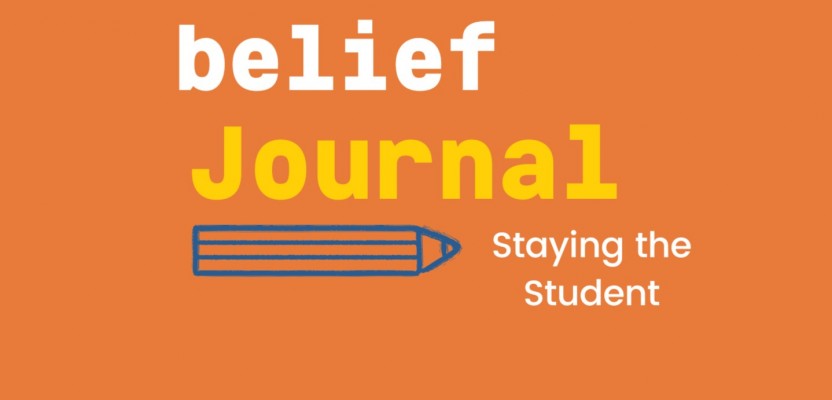From my new blog BELIEF JOURNAL
A personal motivation is the key to unlocking belief. The state of mind produced when suffering from an internal health issue such as anxiety, opens the mind to adopting new ways of relieving the feelings, thoughts and physical symptoms of such issues. It can be argued that it is absolutely necessary for someone who has been raised non-religious to have an internal crisis in order to prompt the adoption of faith.
Religion was never present in my childhood. It was something that people did that never made sense to me because I had never received any religious education from my parents. The only way I was able to perceive religion was through study of it at school. What is missing when you study religion with no affiliation is the lack of a personal relationship. While parts of the religion may seem exciting or fun, there doesn’t appear to be any more benefits to living a faithful life than the life of an atheist – one lacks the personal motivation and that is key to adopting a religion.
A motivation from within is the key. An internal struggle creates the ideal conditions for the adoption of a faith and the creation of a belief system in general. One is forced to find a way out, to alleviate the overwhelming feelings. Many people state that they like the morals or values of a religion, but would never believe in God, however they fail to uphold the difficult parts of a religious doctrine because there is no personal connection or motivation for them. The doctrine of Islam is very clearly defined as living a good and pure life, where virtues such as honesty, patience, charity and self-control are paramount. Yet without internal motivation, those who are born without religion are likely to be deterred by parts of the religion that advise against the things they enjoy in their atheist existence. Particularly in the West, the mostly negative perception of Islam as defined by the media stunts one’s acceptance of what is a helpful doctrine for overcoming the real hardships of life.
In 2013, there were 8.2 million cases of anxiety in the UK and it has been recorded that anxiety affects 18.1% of adults in America. It is a global issue and all those who suffer for long enough develop coping mechanisms to deal with the strain. My proposition that anxiety opens the door to faith comes from pure personal experience that I wish to share as a possible helpline for those who are afflicted by any mental health issue. It won’t solve your anxiety, but for many of us, that isn’t the goal, it is to live and be strong enough to not let the thoughts overcome you, something that a new perspective, the perspective of Islam allows us to take.
When first introduced to the religion as a result of my partner and her intentions for our future, I was sceptical of how I would develop a continual interest for the religion. Fortunately – now I believe it was by the grace of God – I was experiencing overwhelming anxiety at the same time and was beginning a journey of self-healing and self-exploration. This coincided with a talk that I watched given by leading Islamic scholar Mufti Menk – who stated that Islam is a journey and it is our duty to try our best. Muslims accept the fact that their souls, our souls, are bent towards immoral desires and that we must try our best to resist these tests. Sometimes, we succeed and sometimes we make mistakes and need to ask for forgiveness. The same goes for anxiety, it is an overwhelming force that can make use do things that we feel guilty about, gives us thoughts that make us afraid and pushes us to hopelessness. The idea that life is a journey has been a comforting one. It lowers expectations of you. It says “it is okay if you fall back into your old ways” because you are still doing your best at the end of the day; you are still putting a small amount of effort in. Even when you resign yourself to days of rest or recovery you are trying because you understand what your body and mind need for it to heal. You accept that the journey will have twists and turns, but as long as you are trying to do better by yourself and others, you are on the right path.
Alongside this there have been two other major learnings in my 8 months of adopting religion that I believe are vital for those who suffer with anxiety. The constant stimulation of the world is one that often triggers anxiety or panic attacks and the internal suffering of overthinking these events, dialogues and passing interactions can be draining. Particularly when one’s anxiety begins to harass the mind with spiteful thoughts that lead to lashing out, exploding on a loved one or even losing your cool with a stranger. Islam has been an excellent guide to minimising triggering stimulation and finding peace in the midst of an uncomfortable set of thoughts. Self-control is paramount in the religion, in two ways primarily – avoiding lust and tempering anger – however the application of these principles to general stimulation or overwhelming emotion is both effective and easy to commit to.
The idea of visual Zina – or lustful looks – is something that has become uncomfortably normalised in Western culture. Men do lurk on street corners and stare women down without a care for their feelings or thoughts. Islam teaches that one should lower their gaze to avoid lighting the spark of lust that eventually leads to immoral sexual acts. Aside from perpetuating a culture respectful of others (I'm speaking to my fellow men here!) the maintenance of a mind unstimulated by aggressive sexual thoughts is inherently a calmer and less anxious one. Further to this, the general practice of lowering one’s gaze when out an about can lead to a more introspective approach to oneself and a withdrawal – when things get overwhelming – of the mind from added stimulants. The hadiths (a set of guidelines based on the life of the Prophet Muhammad PBUH) also tell that one should temper their anger by sitting or lying down when feeling out of control. The practice of calming one’s body and as a result one’s mind is unbelievably useful when attempting to reconcile with someone during an argument or avoid saying spiteful things that you would later forget. This isn’t about the suppression of emotion; it is about tempering the physical and verbal responses so that you are more easily understood by your loved ones.
Life is hard. For those who suffer from mental health issues this is not a new concept. However, Islam reframes that idea. It has given me motivation to keep going even when things are hard because the Qur’an tells me that this hardship is meant to be. This hardship is here because it is testing me. Whether you decide to believe that this test is from a higher power or not, it is still – at the end of the day – a test. And with testing, one grows and has the opportunity to learn. Life is hard and yet we are all getting better at living it. Look at where you were a year ago, a month ago or even yesterday. If you are seeking out help and have found this piece, you are already making choices that help you to grow and heal. You have overcome a test and have become stronger as a result. And feeling that, I believe, is a way to continue to learn how to live with your inner struggle. By accepting belief, you are strengthening your personal motivation and by having that motivation in the first place, you are opening yourself to accepting belief. You uncover a way to help yourself.



